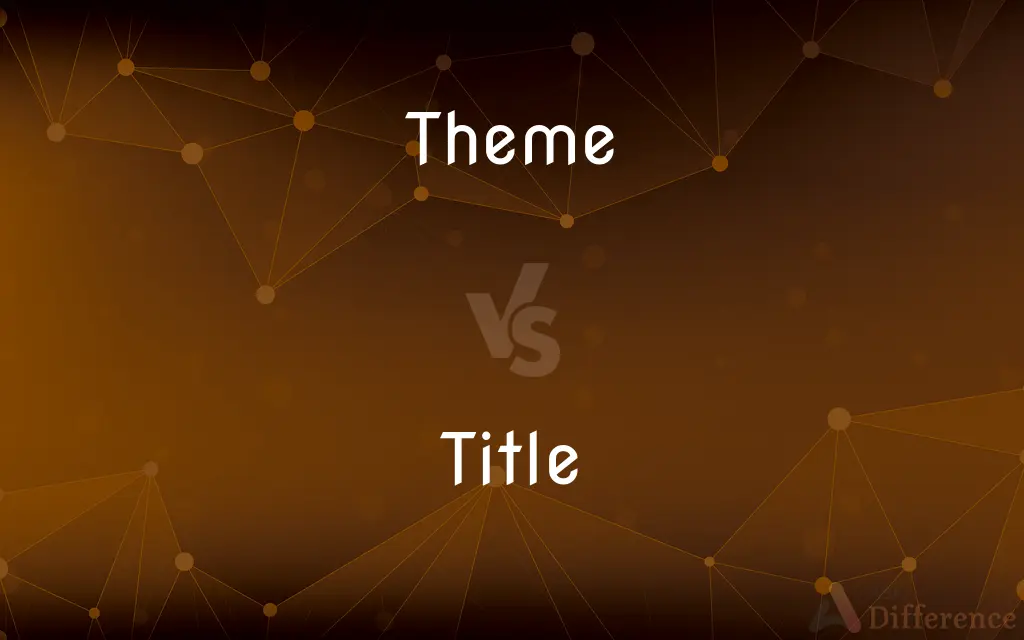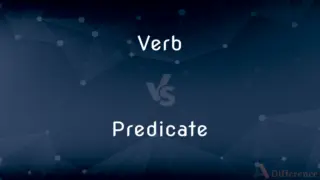Theme vs. Title — What's the Difference?
By Tayyaba Rehman & Urooj Arif — Updated on March 13, 2024
Theme is the underlying message or the central idea in a piece of writing, while title is the name given to a work of art, book, chapter, or other compositions.

Difference Between Theme and Title
Table of Contents
ADVERTISEMENT
Key Differences
A theme is an overarching idea, moral, or message that runs through a narrative, shaping its meaning and direction. It is abstract and often not stated directly, requiring interpretation. On the other hand, a title is a specific and distinctive name given to a piece of writing, artwork, or musical composition. It serves as a direct identifier, often reflecting the main theme, subject, or setting of the work, but it does so in a concrete and explicit way.
For instance, the theme of love overcoming obstacles can be found in many stories and films, where characters must overcome various challenges to be with their loved ones. For example, the title "Romeo and Juliet" immediately suggests the main characters and hints at the romantic tragedy theme.
Themes are integral to the content and are meant to provoke thought, convey messages, or explore complex subjects like morality, human nature, or societal issues. They are not just central to literary works but any narrative form, including films, plays, and even songs, where they add depth and layers of meaning. Titles, conversely, are essential for identification and often the first element of a work that audiences encounter. They can be descriptive, evocative, or symbolic, but their primary function is to distinguish one work from another and to give a hint about the content or tone of the work, like "The Great Gatsby," which evokes curiosity about who Gatsby is and what makes him great.
While themes delve into the essence and universals of human experience, challenging readers or viewers to think and feel deeply about the subjects presented, titles serve as practical tools for reference and categorization. They might be memorable or catchy, but they don't necessarily provide direct insight into the thematic depth or complexity of the work.
Both themes and titles play crucial roles in the reception and interpretation of creative works. While the theme enriches the content and invites deeper engagement, the title provides an entry point and an initial framework for understanding. Their interplay helps to shape the audience's experience, guiding interpretation and emotional response.
ADVERTISEMENT
Comparison Chart
Definition
The underlying message or central idea of a work.
The name given to a work of art, book, chapter, or composition.
Nature
Abstract and interpretative.
Concrete and specific.
Role
Provides depth, meaning, and universal insights.
Serves as an identifier and can hint at the theme or subject.
Presence
Not directly stated, requires interpretation.
Directly stated and visible.
Examples
Love conquering obstacles, the battle between good and evil.
"Pride and Prejudice," "The Catcher in the Rye," "To Kill a Mockingbird."
Compare with Definitions
Theme
An underlying message conveyed by a narrative.
The story's theme highlights the importance of courage.
Title
The name of a book, article, or other work.
War and Peace is one of Tolstoy's famous titles.
Theme
A central idea explored in a story.
The theme of sacrifice is evident in The Gift of the Magi.
Title
A headline or the main name of a publication.
The article's title caught everyone's attention.
Theme
A recurring idea that provides insight into the human condition.
The novel explores the theme of redemption throughout its chapters.
Title
The chosen name for a film or play.
The movie's title, Gone with the Wind, is iconic.
Theme
A moral or lesson conveyed through a narrative.
The fable's theme teaches the value of honesty.
Title
The formal designation of a piece of music or art.
Beethoven's Symphony No. 5 is a well-known title.
Theme
An abstract concept around which a story is built.
Friendship is a key theme in many children's books.
Title
A label given to a creative work for identification.
The painting's title, Starry Night, evokes its imagery.
Theme
A topic of discourse or discussion.
Title
A title is one or more words used before or after a person's name, in certain contexts. It may signify either generation, an official position, or a professional or academic qualification.
Theme
A subject of artistic representation.
Title
The name of a book, composition, or other artistic work
The author and title of the book
Theme
An implicit or recurrent idea; a motif
A party with a tropical island theme.
Title
A name that describes someone's position or job
Leese assumed the title of director general
Theme
A short composition assigned to a student as a writing exercise.
Title
The position of being the champion of a major sports competition
Davis won the world title for the first time in 1981
Theme
(Music) A recurring melodic element in a composition, especially a melody forming the basis of a set of variations.
Title
A right or claim to the ownership of property or to a rank or throne
The buyer acquires a good title to the goods
A grocery family had title to the property
Theme
See topic.
Title
(in church use) a fixed sphere of work and source of income as a condition for ordination.
Theme
A stem.
Title
Give a name to (a book, composition, or other work)
A report titled The Lost Land
Theme
A subject, now especially of a talk or an artistic piece; a topic.
Title
An identifying name given to a book, play, film, musical composition, or other work.
Theme
A recurring idea; a motif.
Title
A general or descriptive heading, as of a book chapter.
Theme
A concept with multiple instantiations.
Variations on the theme of entrepreneurial resourcefulness
Title
A written work that is published or about to be published
The titles in the publisher's fall catalog.
Theme
Any of various colors, or color palettes, in which a design is offered; (GUI) any of various skins for an app, affecting the visuals and perhaps other elements such as sound effects.
Switch to a dark theme to conserve battery power
Title
A division of a legal code, generally consisting of multiple related statutes.
Theme
(dated) An essay written for school.
Title
Often titles Written material to be read by viewers that is included in a film or television show, typically presenting credits, narration, or dialogue.
Theme
(music) The main melody of a piece of music, especially one that is the source of variations.
Title
A written piece of translated dialogue superimposed at the bottom of the frame during a film; a subtitle.
Theme
A song, or a snippet of a song, that identifies a film, a TV program, a character, etc. by playing at the appropriate time.
Title
A formal appellation attached to the name of a person as a sign of office, rank, profession, or hereditary privilege.
Theme
(grammar) The stem of a word.
Title
A descriptive name; an epithet
The dubious title of the worst bowler in the league.
Theme
(linguistics) thematic relation of a noun phrase to a verb.
Title
A right or claim, or the basis of a right or claim
"The weight of a fish is commonly its only title to fame" (Henry David Thoreau).
Theme
(linguistics) Theta role in generative grammar and government and binding theory.
Title
A form of ownership free of valid claims by other parties.
Theme
(linguistics) Topic, what is generally being talked about, as opposed to rheme.
Title
The aggregate evidence that gives rise to a legal right of possession or control.
Theme
A regional unit of organisation in the Byzantine empire.
Title
The instrument, such as a deed, that constitutes this evidence.
Theme
(transitive) To give a theme to.
We themed the birthday party around superheroes.
Title
Sports & Games A championship
Which boxer won the heavyweight title?.
Theme
To apply a theme to; to change the visual appearance and/or layout of (software).
Title
A source of income or area of work required of a candidate for ordination in the Church of England.
Theme
A subject or topic on which a person writes or speaks; a proposition for discussion or argument; a text.
My theme is alway one and ever was.
And when a soldier was the theme, my nameWas not far off.
Title
A Roman Catholic church in or near Rome having a cardinal for its nominal head.
Theme
Discourse on a certain subject.
Then ran repentance and rehearsed his theme.
It was the subject of my theme.
Title
To give a name or title to.
Theme
A composition or essay required of a pupil.
Title
An appellation given to a person or family to signify either veneration, official position, social rank, the possession of assets or properties, or a professional or academic qualification. See also :Category:Titles
Theme
A noun or verb, not modified by inflections; also, that part of a noun or verb which remains unchanged (except by euphonic variations) in declension or conjugation; stem.
Title
(property law) Legal right to ownership of a property; a deed or other certificate proving this.
A good title to an estate, or an imperfect title
Theme
That by means of which a thing is done; means; instrument.
Title
In canon law, that by which a beneficiary holds a benefice.
Theme
The leading subject of a composition or a movement.
Title
A church to which a priest was ordained, and where he was to reside.
Theme
The subject matter of a conversation or discussion;
He didn't want to discuss that subject
It was a very sensitive topic
His letters were always on the theme of love
Title
The name of a book, film, musical piece, painting, or other work of art.
I know the singer's name, but not the title of the song.
Theme
A unifying idea that is a recurrent element in a literary or artistic work;
It was the usual `boy gets girl' theme
Title
A publication.
The retailer carries thousands of titles.
Buyers of the new video game console can choose from three bundled titles.
Theme
(music) melodic subject of a musical composition;
The theme is announced in the first measures
The accompanist picked up the idea and elaborated it
Title
A section or division of a subject, as of a law or a book.
Theme
An essay (especially one written as an assignment);
He got an A on his composition
Title
A written title, credit, or caption shown with a film, video, or performance.
The titles scrolled by too quickly to read.
Theme
(linguistics) the form of a word after all affixes are removed;
Thematic vowels are part of the stem
Title
(bookbinding) The panel for the name, between the bands of the back of a book.
Theme
Provide with a particular theme or motive;
The restaurant often themes its menus
Title
The subject of a writing; a short phrase that summarizes the entire topic.
Title
A division of an act of law
Title II of the USA PATRIOT Act
Title
(sports) The recognition given to the winner of a championship in sports.
Title
A long title.
Title
A short title.
Title
(transitive) To assign a title to; to entitle.
Title
An inscription put over or upon anything as a name by which it is known.
Title
The inscription in the beginning of a book, usually containing the subject of the work, the author's and publisher's names, the date, etc.
Title
The panel for the name, between the bands of the back of a book.
Title
A section or division of a subject, as of a law, a book, specif. (Roman & Canon Laws), a chapter or division of a law book.
Title
An appellation of dignity, distinction, or preëminence (hereditary or acquired), given to persons, as duke marquis, honorable, esquire, etc.
With his former title greet Macbeth.
Title
A name; an appellation; a designation.
Title
That which constitutes a just cause of exclusive possession; that which is the foundation of ownership of property, real or personal; a right; as, a good title to an estate, or an imperfect title.
Title
A church to which a priest was ordained, and where he was to reside.
Title
To call by a title; to name; to entitle.
Hadrian, having quieted the island, took it for honor to be titled on his coin, "The Restorer of Britain."
Title
A heading that names a statute or legislative bill; may give a brief summary of the matters it deals with;
Title 8 provided federal help for schools
Title
The name of a work of art or literary composition etc.;
He looked for books with the word `jazz' in the title
He refused to give titles to his paintings
I can never remember movie titles
Title
A general or descriptive heading for a section of a written work;
The novel had chapter titles
Title
The status of being a champion;
He held the title for two years
Title
A legal document signed and sealed and delivered to effect a transfer of property and to show the legal right to possess it;
He signed the deed
He kept the title to his car in the glove compartment
Title
An identifying appellation signifying status or function: e.g. Mr. or General;
The professor didn't like his friends to use his formal title
Title
An established or recognized right;
A strong legal claim to the property
He had no documents confirming his title to his father's estate
He staked his claim
Title
(usually plural) written material introduced into a movie or TV show to give credits or represent dialogue or explain an action;
The titles go by faster than I can read
Title
An appellation signifying nobility;
`your majesty' is the appropriate title to use in addressing a king
Title
An informal right to something;
His claim on her attentions
His title to fame
Title
Give a title to
Title
Designate by an identifying term;
They styled their nation `The Confederate States'
Common Curiosities
Can a title reflect the theme of a work?
Yes, titles often reflect the theme or main subject, providing hints about the content or the message of the work.
How does a title differ from a theme?
A title is the specific name given to a work, serving as an identifier, while a theme is an abstract concept or message conveyed within the work.
What is a theme in literature?
A theme is the central idea or message explored throughout a work of literature, reflecting on human experience or societal issues.
Why is theme important in a story?
Themes add depth and layers of meaning to a story, challenging the audience to think deeply about the subjects presented.
What makes a good title?
A good title is memorable, reflective of the work's content or theme, and intriguing enough to draw the audience's interest.
How do I identify a theme in a work?
Identifying a theme involves looking for recurring ideas, messages, or moral questions explored throughout the work.
What role does the title play in marketing a work?
Titles are crucial in marketing, as they are often the first element that captures potential readers' or viewers' attention.
Can a work have multiple themes?
Yes, many works explore multiple themes, reflecting on various aspects of life or human nature.
Are themes unique to literary works?
No, themes can be found in all forms of narrative, including films, plays, and even songs, where they add depth and meaning.
Is the theme always explicitly stated in a work?
No, themes are often implicit and require interpretation by the reader or viewer.
How can a title affect the perception of a work?
A title can set expectations, influence preconceptions, and guide the initial understanding of the work's content or tone.
How should a writer choose a title?
A writer should choose a title that is both reflective of the work's theme and engaging for the target audience.
Why might an author use a misleading title?
An author might use a misleading title to challenge readers' expectations, create surprise, or engage them in deeper thematic exploration.
Can a simple title still be effective?
Yes, simplicity in a title can be effective if it is evocative or hints at the work's deeper themes or content.
Can the theme of a work change over time?
While the theme itself may not change, interpretations of it can vary over time or across different cultural contexts.
Share Your Discovery

Previous Comparison
Verb vs. Predicate
Next Comparison
Industry vs. FactoryAuthor Spotlight
Written by
Tayyaba RehmanTayyaba Rehman is a distinguished writer, currently serving as a primary contributor to askdifference.com. As a researcher in semantics and etymology, Tayyaba's passion for the complexity of languages and their distinctions has found a perfect home on the platform. Tayyaba delves into the intricacies of language, distinguishing between commonly confused words and phrases, thereby providing clarity for readers worldwide.
Co-written by
Urooj ArifUrooj is a skilled content writer at Ask Difference, known for her exceptional ability to simplify complex topics into engaging and informative content. With a passion for research and a flair for clear, concise writing, she consistently delivers articles that resonate with our diverse audience.














































